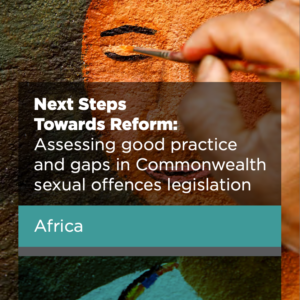Eswatini’s sexual offences laws are contained in the Sexual Offences and Domestic Violence Act 2018.
Eswatini enacted a new sexual offences law in 2018. Some sexual assault provisions covered by this review and the criteria below meet good practice standards. However, other areas require further reform, including repealing provisions that criminalise consensual same-sex sexual activity.
The laws meet the good practice standards in a number of ways: all forms of non-consensual sexual penetration – by penis, objects and other body parts – of all orifices are crimes; there are several specific child sexual offences; corroboration is not required for rape and other sexual assaults; and evidence of the past sexual conduct of the complainant is not admissible. The legislation does not criminalise consensual sexual relations with a person with disability. The age of consent is 18 years for opposite-sex sexual activity.
Areas of the law that do not meet good practice include the lack of close-in-age defences to child sexual assaults to prevent criminalising consensual sexual activity between young people. Sodomy is a common law offence. Criminalising consensual same-sex sexual activity has been held in court decisions in other Commonwealth jurisdictions, such as Belize, Botswana, India and Trinidad and Tobago, to be unconstitutional. Laws that criminalise consensual same-sex sexual activity should be repealed and all non-consensual sexual acts, including anal ‘rape’, should be included in the general sexual assault provisions, such as ‘rape’ and ‘sexual assault’, as well as in child sexual offences. All of these crimes should be gender-neutral.
Eswatini is a state party to relevant international and regional human rights treaties, including the Convention on the Elimination of All Forms of Discrimination against Women, Convention on the Rights of the Child, Convention on the Rights of Persons with Disabilities, Convention against Torture and Other Cruel, Inhuman or Degrading Treatment or Punishment, and International Covenant on Civil and Political Rights. It is also a party to the African Charter on Human and Peoples’ Rights. It has signed but not ratified the African Charter on Human and Peoples’ Rights on the Rights of Women in Africa (Maputo Protocol).
Read more about the criminalisation of LGBT people in Eswatini.
The full assessment of Eswatini is also available here.



